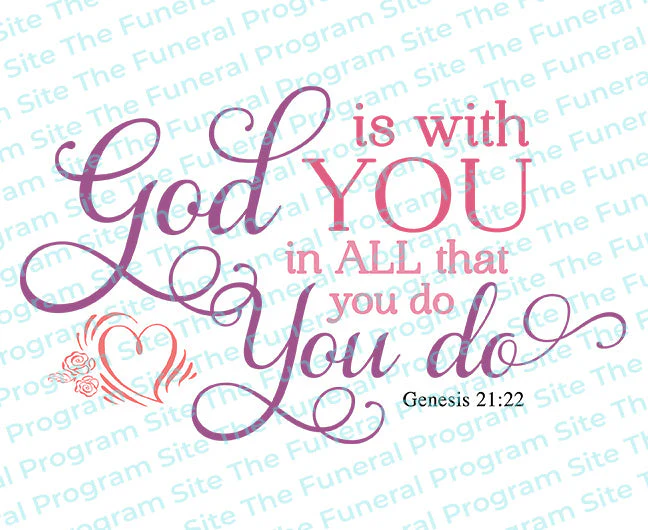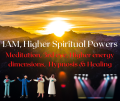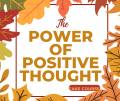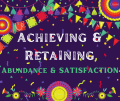
Have you ever noticed how some people seem to shift the energy of a room simply by withdrawing? They don’t yell. They don’t chase. They simply pull back—and suddenly, everything changes. Conversations pause. People become uneasy. The atmosphere shifts. Why?
Because silence, when rooted in awareness, is one of the most powerful forces in existence.
In nearly every tradition—from the wisdom of Taoist masters, to the silence of Christian monastics, to the concept of Mauna (sacred silence) in Hindu philosophy, and the inner retreat honored in African and indigenous mysticism—withdrawal is not seen as weakness. It is seen as strength. As sovereignty.
Let’s talk about that. Let’s talk about becoming unavailable—not from apathy, but from awakening.
Emotional Availability as a Trap
From a young age, we are taught to be available. To smile when we want to cry. To say yes when we mean no. To respond immediately. To fix things. To be helpful. To be the “good” one. This is the mask Carl Jung called the persona—the face we wear to be loved, accepted, and kept close.
But what happens when that persona becomes our prison?
Jung taught that our psyche is not a machine—it’s an energy system. Every reaction, every argument, every need to explain or defend yourself is an expenditure of psychic energy. And when you allow others to access that energy without discernment, you become depleted, anxious, frustrated… hollow.
In Buddhism, we call this suffering born of attachment. In Christianity, it is losing your peace by “casting pearls before swine.” In African traditional wisdom, it is said: “He who cannot say no gives away his soul in baskets.”

Becoming a Mystery: The Power of Withdrawal
When you stop reacting, stop explaining, stop being instantly available—people panic.
They don’t panic because they care.
They panic because you no longer serve their emotional agenda.
You become unpredictable, and that threatens the stories others have projected onto you. The friend who only calls in crisis. The partner who thrives on your validation. The colleague who expects your silence in exchange for peace.
They were not relating to you—they were relating to the role you played.
But now, you are breaking the spell.
In Jewish mysticism (Kabbalah), there is a sacred practice called Tzimtzum—the divine withdrawal. God steps back to allow the world to exist. You, too, can step back to allow your true self to emerge.
Unavailability as a Spiritual Practi
This isn’t about ghosting people or living in bitterness. This is conscious unavailability. A sacred form of individuation, as Jung described it—the path to becoming whole, authentic, and true.
And yes, there is a cost.
You may be misunderstood. People will accuse you of changing. Of being distant. Of acting “cold.”
But they’re not reacting to your true self. They’re reacting to the loss of the utility you once provided.
In Baháʼí teachings, we’re reminded that truth is more important than comfort. You cannot live in your truth and maintain the illusion of being everything for everyone.
Your Energy Is Sacred
Your energy is a divine resource. And if you don’t learn to guard it, others will exploit it.
Every time you argue unnecessarily, respond to provocation, or explain yourself to someone who isn’t listening—you bleed life-force.
Every tradition has its equivalent of this wisdom:
- Taoism says, “Those who know do not speak. Those who speak do not know.”
- Christian mystics like Meister Eckhart taught, “Only the silent hear God.”
- Sufi poets like Rumi warned, “Don’t get lost in your pain, know that one day your pain will become your cure.”
But only if you withdraw from the noise and listen within.
The Sacred Silence
When you choose silence over reaction, you reclaim your power. And this silence is not empty—it is full of presence. It unsettles manipulators because it strips them of their ability to script your emotions.
It reveals projections.
It dismantles narratives.
It purifies.

Carl Jung said, “We do not become enlightened by imagining figures of light, but by making the darkness conscious.” When you stop feeding the roles others have assigned to you, their shadows emerge. And while they scramble to reassign you, you step into sovereignty.
African elders say, “The river that forgets its source dries quickly.” When you cut off external demands, you return to your source. You reconnect with your essence. And that’s where healing begins.
When You Become Whole, You Become Rare
Being unavailable doesn’t mean being selfish. It means being self-honoring.
It means turning off your phone to nourish your spirit.
It means declining a conversation that would drain you.
It means no longer defending your worth.
And yes, it means walking alone—at least for a while. Jung called this sacred isolation a rite of passage for the soul. In Zen Buddhism, it’s the kensho—the direct experience of your true nature.
You will lose people.
But you will find yourself.
You will be called difficult.
But you will finally know peace.
You will be misunderstood.
But you will begin to be respected—not for being available, but for being whole.
The Rebirth Through Sacred Solitude
After the silence… comes rebirth.
- Where anxiety once ruled, there is calm.
- Where you once chased, you now choose.
- Where you once feared being alone, you now revel in your solitude.
You are no longer a puppet. You are the master.
You are no longer a reactor. You are a creator.
This is not the end of your relationships. It is the end of your servitude. And from here, only real, soul-nourishing, reciprocal connections will remain.
🌟 Your Invitation to Awaken
If this message has resonated with you, write in the comments below: “I choose my peace.” Let it be your affirmation, your declaration, your line in the sand.
You are not here to please the world.
You are here to awaken to your divinity.
You are here to become a lighthouse—not a lifeboat.

Frequently Asked Questions: The Sacred Power of Being Unavailable
1. What does it mean to become “unavailable” as described in this text, and how is it different from simply being apathetic or neglectful? Becoming “unavailable” is a conscious and intentional act of withdrawing energy and attention, not out of indifference, but as a means of self-preservation and spiritual awakening. It’s about choosing oneself over emotional chaos by ceasing to react, explain, or be instantly accessible to others’ demands. This differs from apathy or neglect, which stem from a lack of care or responsibility, whereas conscious unavailability is rooted in self-awareness, valuing one’s energy, and prioritizing inner peace and authenticity. It’s a deliberate stepping back to allow one’s true self to emerge, rather than an abandonment of relationships or responsibilities.
2. Why does the text suggest that being constantly emotionally available can be detrimental to our well-being? The text argues that constant emotional availability often stems from learned behaviors aimed at gaining approval and acceptance (the “persona”). However, this can become a “prison” by leading to the depletion of our psychic energy. Every reaction, argument, or need to explain oneself expends this energy, and when we allow others to access it without discernment, we become drained, anxious, and hollow. This constant giving without boundaries leads to suffering, as described in various traditions, because it sacrifices our inner peace and sense of self for the sake of others’ emotional agendas.
3. What is the “power of withdrawal” mentioned in the text, and how does it affect our relationships with others? The power of withdrawal lies in its ability to disrupt established patterns of interaction and expectations. When we stop being predictable and instantly available, others may panic because they can no longer rely on us to fulfill their emotional needs or play the roles they’ve assigned to us. This withdrawal can break the “spell” of inauthentic relationships built on utility rather than genuine connection. While it may initially cause discomfort or misunderstanding, it ultimately creates space for our true selves to emerge and allows for more authentic and respectful relationships to form based on who we are, not just what we do for others.
4. How does the concept of “sacred silence” relate to the idea of becoming unavailable, and what benefits does it offer? Sacred silence, rooted in awareness, is presented as a powerful force that allows us to reclaim our power by choosing silence over reaction. This silence is not empty but full of presence. It strips manipulators of their ability to control our emotions, reveals projections others have placed upon us, and dismantles inauthentic narratives. By withdrawing into this inner silence, we can purify our minds, reconnect with our essence, and begin to heal. It allows us to listen within, as emphasized by various spiritual traditions, and access deeper truths.
5. The text mentions that becoming unavailable might lead to misunderstandings and accusations. Why does this happen, and how should one navigate these reactions? Misunderstandings and accusations (such as being called “cold,” “distant,” or “changed”) arise because our unavailability disrupts the expectations and roles others have become accustomed to. They are often reacting to the loss of the “utility” we once provided in their lives, rather than to our true selves. To navigate these reactions, it’s crucial to remember that our priority is our own peace and authenticity. We must stand firm in our choice to honor our energy, understanding that not everyone will grasp our need for boundaries. The text suggests that truth is more important than comfort, and while it may be challenging, staying true to ourselves will ultimately lead to more genuine connections with those who respect our boundaries.
6. What is the significance of protecting one’s energy, as highlighted in the text, and what are some practical ways to do this? Protecting one’s energy is crucial because it is considered a “divine resource” that can be easily exploited if we don’t guard it. Unnecessary arguments, responding to provocation, and explaining ourselves to those who aren’t listening all drain our life-force. Practical ways to protect our energy include consciously choosing silence over reaction, setting boundaries by saying “no” when necessary, declining draining conversations or commitments, turning off devices to nourish our inner selves, and no longer feeling the need to defend our worth to others.
7. How does becoming unavailable contribute to the process of “individuation” or becoming one’s true self, according to the text? Becoming unavailable is presented as a “sacred form of individuation,” aligning with Jung’s concept of the path to becoming whole, authentic, and true. By withdrawing from external demands and expectations, we create the space necessary to connect with our inner selves and shed the “persona” we’ve adopted to please others. This “sacred isolation” allows for self-discovery and the direct experience of our true nature. It’s a process of returning to our “source,” which is essential for healing and becoming fully realized individuals.
8. What is the ultimate outcome or “rebirth” that the text suggests can occur through the practice of conscious unavailability? The text suggests that after the period of sacred silence and conscious unavailability comes a “rebirth.” This rebirth is characterized by a shift from anxiety to calm, from chasing external validation to making conscious choices, and from fearing solitude to reveling in it. We move from being a “puppet” reacting to others’ needs to being a “master” creating our own lives. This process marks the end of servitude in unhealthy relationships and the beginning of genuine, soul-nourishing connections built on reciprocity and respect for boundaries. Ultimately, the goal is to awaken to our true divinity and become a source of inner strength (“a lighthouse”) rather than constantly trying to rescue others (“a lifeboat”).


















0 responses on "The Sacred Power of Being Unavailable: Choosing Yourself Over Emotional Chaos"